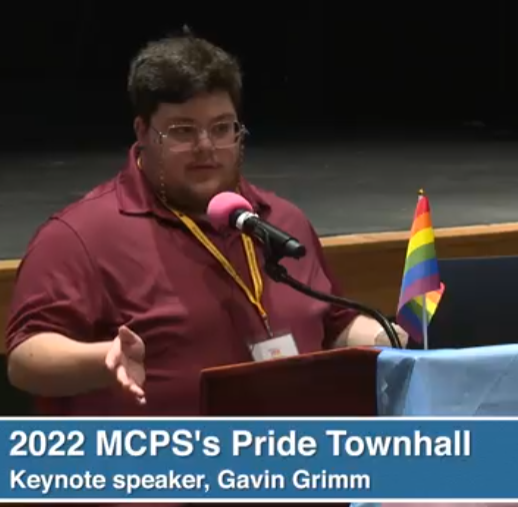Maryland school district third annual “Pride Town Hall” celebrates transgenderism

Montgomery County Public Schools (MCPS), one of the largest public school systems in Maryland, held its third annual “Pride Town Hall” this past May and pushed transgenderism narratives because of its headline speaker.
The school district invited Gavin Grimm, a transgender activist, to give the main remarks for the town hall. Grimm was heralded by MCPS as “a nationally known advocate for transgender rights,” though the oft-used “nationally known” may be subjective phrase to drum up publicity for an invited speaker or guest. MCPS’s online description used Grimm’s preferred gender pronoun of “he” and “his.”
Grimm spoke from a podium, which had two small rainbow pride flags and a larger transgender flag draped over the front, to an audience of around three dozen attendees.
Grimm’s angst and resentment were apparent to the audience when the speaker referred to the past when Grimm sued a local Virginia school district over access to men’s bathrooms as a student. Grimm, after beginning the speech, said, “I was in a school system who was very comfortable dragging out a long and expensive legal battle for the wrong reasons.”
The keynote speaker declared, “I’m glad we’re in an affirming space” to be able to talk about transgender rights in public schools. Grimm blasted conservative school districts and school boards in places such as Texas over the claims that the law prevents ideological activism and said, “I don’t really believe you.”
Much of Grimm’s remarks emphasized LGBTQIA+ activism at the high school level and said students “should demand what they deserve,” such as having a Gay Straight Alliance club at high schools because “it’s not an ask or a want; it’s a right.”
Grimm recommended that “parents can step in” to create Gay Straight Alliance clubs for their children because “they can exist; they should exist.” The speaker opined, “It is so important that young people are affirmed anywhere they go, especially if they don’t have affirmation in their home or within their inner circle.”
Continuing the victimization rhetoric, Grimm said that transgender people “have to put up with a lot of transphobia” in public education and blamed local communities as the sources of transphobia.
“We fail to recognize,” Grimm told the audience, that the LGBTQIA+ community is a part of the local community such as the local neighborhood, city, or region.
Based on personal experience, Grimm criticized his hometown and county in southeastern Virginia because he “transitioned in a very backwards area… it’s not just transphobia; it’s everything.” Grimm said, “There was a lot of fear” and referred to conversations where people mentioned how brave Grimm must have been to sue the county school district. “I’m not saying I’m neither of those things,” Grimm proclaimed, but “I believed in what I deserved.” Grimm claimed, “I didn’t know how physically safe I could be” in high school due to his transgender identity.
Southeastern Virginia, like many places, has “a culture which is not affirming, which is not free,” in Grimm’s opinion because “I was bullied from day one” when Grimm lived life as a young girl.
Grimm’s remarks concluded with outright political and ideological activism, “If you feel empowered… whether that is support for LGBTQ students… you always have the power to raise your voice and make those choices to speak up for yourself.” Grimm said, “It is important to be proactive” because transgender activism is important.
Reflecting on transgender rights and the past, Grimm noted, “It’s been a long road… [but] the language has changed so much, the dialogue has changed so much” within seven years when it comes to LGBTQIA+ issues in the American public.
Implicitly referring to parental rights bills in Republican-majority states, Grimm declared that the transgender community is under assault because “our agency [and] our personhood [will be] banned and restricted.” Instead, activists should turn to young people because they “are insatiable for justice” and it falls to “marginalized communities” to be activists.
As background, Grimm attended Virginia’s Gloucester County Public Schools and, in 2015, chose to use the men’s restroom though Grimm was a biological female. The school district disagreed with Grimm’s assertions, which led to Grimm suing the district in in 2015 for violating Grimm’s constitutional rights. The lower courts ruled that the Virginia school district violated constitutional rights under Title IX for denying access to use a men’s restroom. In 2021, the U.S. Supreme Court declined to hear the case, which meant that the lower court decisions in favor of Grimm would stand.
Grimm’s Twitter profile on social media highlighted the preferred pronouns, in addition to the self-description of, “22y/o trans activist. Trans, Bisexual, Autistic and fat, Victor in landmark lawsuit Gavin Grimm VS GCSB.” Grimm included a link to the American Civil Liberties Union website, which had represented Grimm in the court case. The Twitter profile featured Grimm’s co-authored book published by Harper Collins, “If You’re a Kid Like Gavin,” which is “the True Story of a Young Trans Activist.”
It appears that Grimm’s primary employment is work as an activist.
Grimm’s former school district in Gloucester County, Virginia, is demographically different than the political leanings of the typical LGBTQ activist. The county is located on the Chesapeake Bay on the eastern side of Virginia. Its 2020 U.S. Census numbers reported about 39,000 residents, about 88% of whom are white, and a median household income of $71,649. Gloucester County votes overwhelming for Republican political candidates, with the 2020 county vote in favor of former President Donald Trump by a final tally of 66%-31% over Joe Biden, the Democratic Party presidential nominee.
As expected, MCPS’s third annual town hall promoted LGBTQIA+ ideology and did not offer a fair, impartial forum to discuss opposing viewpoints. The first town hall announced a LGBTQIA+ history pilot course for high school students at select schools, while the second town hall discussed the aforementioned pilot program and highlighted the district’s new “LGBTQ community liaison.”




